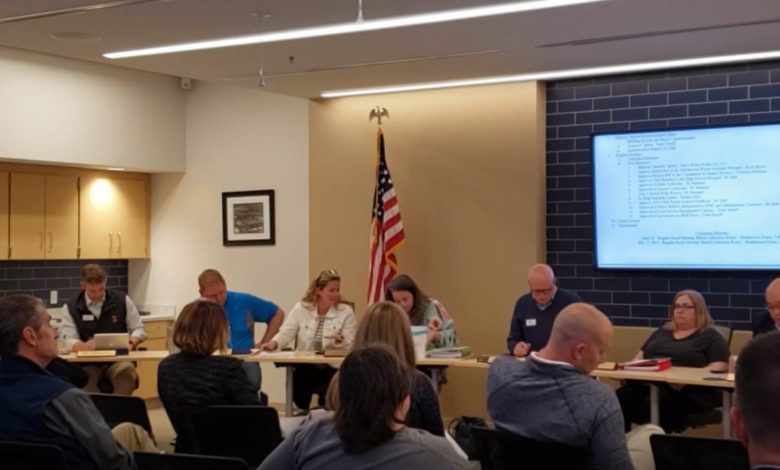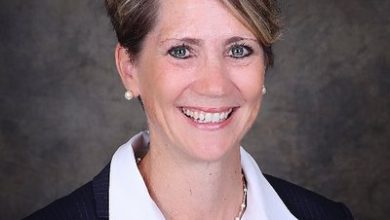M-S Board of Education discusses language in admin contracts

In a vote that traditionally happens in June, the Mahomet-Seymour School Board voted 4-3 to approve contracts for its administrators at the May 21 board meeting.
But members Meghan Hennesy, Ken Keefe and Colleen Schultz did not vote in opposition for the measure because they felt the listed administrators were unfit. Rather, the question sprung from a process clause for certified administrators within the contract that states:
“Evaluation: The Employee shall be evaluated by the Superintendent of Schools pursuant to the evaluation plan for their position in force in the school district. Annually, but no later than March 1st of each contract year, the Board and the Superintendent of Schools shall review with the Administrator, the Administrator’s progress toward established goals and working relationships among the Administrator, the Superintendent, the Board, the faculty, the staff and the community. “
Keefe began the discussion, asking, “What’s the benefit for the school district in having multi-year contracts for the administrators?”
Hall said the multi-year contracts are something the board has granted to certain employees.
“When (administrators) are taking buildings through changes, they have the opportunity to look out ahead and have some long-term vision for their buildings and get to know their staff and have stability,” she said.
Keefe wanted to make sure that whether an administrator was granted a one-year or multi-year contract, they were still required to meet performance measures.
“Generally speaking, you are voting on a contract that has built-in pay increases on the multi-year,” Hall said. “Those are generally offered historically in the district. Those have been offered to people who have shown their excellence in leadership here.
“It does not mean that people who are on multi-year contracts are not evaluated, they are, so that doesn’t go away.”
Board President Max McComb said, “There’s a continuity to that. There’s a planning piece to that, it’s easy for Trent (Nuxoll) to plan things out and know the numbers ahead of time.
“We’re also in a situation now, quite frankly, where good administrative talent is hard to find. We’ve seen that the last few times we’ve went out and done searches.
“Helps us to lock some people in.”
Within the last decade, the Mahomet-Seymour School District has generally granted multi-year contracts for administrators as they prepare for retirement. Exceptions to this practice have been multi-year contracts for Director of Special Education Christine Northrup, Superintendent Rick Johnston and Lindsey Hall and Mahomet-Seymour High School Principal Shannon Cheek.
“We’ve always done (multi-year contracts) to some extent,” McComb said. “Recently we’ve got more serious about them.”
Hennesy said because some of the administrator contracts within the board packet already had contracts until 2021, she believed it would be within the district’s interest to not extend those contracts further before looking at the language of the contract and the procedures carried out by the district.
“Because I haven’t had a chance to be part of that evaluation process that is written into the contract about goal setting and things, I’m hesitant to extend beyond,” she said. “We’ve already got a two-year contract, and I’d like to go through that evaluation process before we extend even further contracts.
“I think we’ve shown these people that they are valuable and that they are staying, and that we want them to stay. So I just think that it might behoove us to get through that cycle before we extend those contracts any further than we already have them.”
Hall said, “The board doesn’t actually evaluate administrators, that’s actually my responsibility; I’m the only employee that the board evaluates.”
Hennesy replied, “But the contract actually has that language in it; I actually read the contracts today, so it does say the superintendent along with the school board will evaluate the administrators, so I guess I’m confused.”
Hall said that she brings feedback to the board after the administrators have been evaluated.
Hennesy said she hadn’t had a chance to see any of the feedback Hall provided.
Schultz asked Hall for the communication she provided to the board on the morning of May 21. Board members typically receive the board packet to review 48 hours in advance of the board meeting, just as the public has access to it during that same time frame.
“The language in the contract says that the board and the superintendent will go over with the administrator goals,” Schultz said. “And (Hall) had said earlier that the school board does not get the goals of the administrators.
“I was confused since the language says that the board goes over the goals with the administrators, and I asked for the goals and I thought that was something the board already had decided since they signed the contract.”
McComb stated that the board receives the building goals, “which are parallel to some extent,” he said.
Board Vice President Lori Larson said the discussion is about semantics.
“There is obviously a discrepancy in language because if you understand that IASB things that govern a board, it’s clear that (Hall) is the person that we evaluate. And she comes back and asks board members, I’m just kind of telling you this, we don’t evaluate.”
Schlutz replied, “It’s clear in here she is the one who does the evaluation, it says the board goes over with the administrator.”
Hennesy said that she would like to see the board fulfill the requirements of the contracts.
“I would just like to move to not extend anything past what we already have until we get a chance to get that process all worked out and we can make sure we are in compliance with the language of the current contracts,” she said.
Hall said she believes that is being accomplished with the current set-up of her “providing feedback to the board about what the administrators are doing, their progress toward the goal.
“That’s been how it’s handled; if there is desire for me to handle that differently, then that’s a conversation among the board.”
Schultz said she would still like to see the goals and the job descriptions.
Keefe said that with the contract starting on July 1 with a board meeting prior to that date, he believed there was still plenty of time to extend the contracts.
“I’m saying that if we want to look at the evaluation process and circle back, we have quite a bit of time,” he said.
McComb replied, “I don’t particularly care for the optics of leaving it on the table…to extend or not extend.”
Board member Jeremy Henrichs questioned the benefits of not extending the contracts.
Keefe replied, “So that we can make sure we are following the terms of the contract and that we are doing our responsibility to evaluate.”
Schultz added, “Right now (the contract) says that every administrator has to come to the board, sit down with them, go over their goals, how they performed. If we don’t want to do that, or if we want to do that, whatever we want to do, that’s what the board has agreed to.”
Larson chimed in.
“Yeah, the language is not good. Cuz’ I don’t want to do that. I don’t want to be a weed-eater.
“We’ve used the contracts based upon the recommendation of our legal counsel and that is what we presented. It’s been brought to our attention, and correct me if I’m wrong because I want to say it right, the way that it’s interpreted now is that the board needs to be part of that and that’s not how we have done it in my two years of being on the board.”
Hall said the board’s responsibility to understand the goals of the administrators has been fulfilled by her informing the board after the evaluation process.
“We’ve got some feedback from Lindsey,” Henrichs said.
“That’s my job and that is my role,” Hall said. “I provide feedback to the board. And provide recommendations to the board.”
“Correct: we’ve had these discussions,” Henrichs said.
Hennesy said that she just wanted to be able to see the goals before voting on these contracts.
“I think it’s irresponsible for me, as a board member, to agree to spend money that has automatic raises,” she said. “I don’t want to be in breach of contract. I value the employees; I’m not saying that we shouldn’t extend multi-year contracts, but I’m saying I think it’s irresponsible to not do all of the due diligence required before we make a vote of that magnitude. This has real impacts on the district.”
Henrichs questioned the doubt about the process the board had in the past.
“I’m just saying the language of that contract said that we sit down and go over goals when we asked for the goals. Lindsey told us that she’s never shared the goals,” Hennesy said.
“Colleen asked me for the goals, and what I said was that those typically haven’t been shared with the board,” Hall said.
“I mean literally what I was asked for is job descriptions and goals this afternoon. So part of my issue was a time commitment this afternoon.
“But what I also shared with Colleen was that the actual, literal goals on paper have not been shared with the board. I’ve provided feedback and progress towards those goals, that is come through discussions with the board in how administrators are progressing towards those.”
Hall chalked it up to over-interpretation or literal interpretation.
“And that’s fine,” she said. “I’m just trying to explain the process that has been used so far.”
Keefe asked if there was a legal or policy problem with sharing the goals with the board.
“Other than I’m not sure it’s the role of the board to do that,” Hall said. “But again, that’s a discussion among all of you. I’ll take the direction of the majority of the board.”
Keefe replied, “I don’t know how the other board members think, but setting goals for the district and, by extension, the administrators, is very much in line with the responsibility of the board.”
Henrichs said that administrators come to the board with building goals.
Typically, building administrators go over their plans for the upcoming school year with the board of education in the early fall.
“They’ve come and given us their plans,” he said.
Schultz replied, “What you want to vote on says they are going to meet with us, every single one of them.
“And what I’m saying is, if that’s not what we intend to do, then we should not vote this very minute to extend that, we should change it.
“Because we already sort of are on the hook for two more years because they have a contract. If we extend this contract for a third year, then we’re saying for three years they have to come in; if that’s not what we want to do, that’s okay, but we should make it match: what we do and what we say.”
McComb said he would agree with Schultz.
“If we are concerned about that in the contract, we need to get it to our attorney to run the changes through him,” he said. “But when we go back and modify the contracts, I doubt the administrators would have a problem with that change in the contract.”
Schultz asked, “Isn’t the point of a contract that they don’t change?”
“You are asking us to vote for right now says something that you’re also saying we don’t do. So I would just like what we do and what we say we do to match.
“And the way that we can accomplish that right now is to not extend and we talk about that later since there are already two years (administrative contracts). No one is going home thinking, ‘Oh my gosh, I have no job.’ And we are saying that we are going to revisit the language.”
Hennesy moved to take the multi-year contracts off the table and vote everyone in on a yearly contract.
Henrichs noted that the yearly contracts have the same language.
“Which is problematic,” Schultz said. “I don’t want to send people home, but maybe we do, send them home without a contract tonight.”
McComb said, “I don’t want to send anybody home with less than what they expected when they came in.
I think if this is a big issue, we can meet with our attorney and get his interpretation on it, then go back and amend everything that we need to.”
Schultz asked again, “Isn’t the point of a contract that it doesn’t get amended?”
Hall said the district could put in an attachment.
McComb said, “I do it all day, every day.”
Keefe noted that both parties would have to be in agreement, though.
After Schultz pointed out the evaluation language within the contract to Merle Giles earlier in the meeting, Giles compared the certified and non-certified contracts.
“The (passage) that Colleen points out that the board and the Superintendent should review with the administrators is the certified side. Non-certified does not have that language.”
Schultz said, “I just want to do what we say we are going to do.”
McComb agreed.
“I think it’s a valid point and we probably need to clean that up in every contract that we have,” he said. “I don’t see the need to hold things up tonight because of that.”
Larson thought about amending her motion to vote on the contracts to include verbiage that the board would revisit the language of the evaluation component.
“Are you making a motion to remove the requirement of the board to be with the administrator for the review?” Giles asked.
Larson said, “I don’t want to be with them; that’s what I would say, I should not be evaluating.”
Hennesy pointed out that the Illinois School Code gives boards the responsibility to oversee the impact of all administrators and teachers.
“We do that now,” Larson said. “(Hall) comes to us and tells us , but I don’t go and tell them what their building goals should be.”
Hennesy replied, “I’m not suggesting that we do that. I’m saying that when we say we only hire one employee, that is not actually what the school code says.”
Larson said, “We evaluate one.”
McComb said, “I’m going to throw in that if we can’t agree whether we should be evaluating or not, that’s another reason to approve it, get some recommendations from the attorney, amend later, have the discussion later, amend if we need to.”
Keefe questioned McComb’s tactics.
“If you have a disagreement with your client about what the language of a contract means, your solution is to approve it and fix it later?”
But McComb said, “I don’t think I ever said that.”
Hennesy said that with the contracts currently executed through 2021, the board of education or the district cannot unilaterally change the contracts.
“(The administrators) have to be part of that process,” she said.
“So I’m saying we can’t extend that multi-year contract with that language,” Hennesy said. “That is the whole point of this discussion.”
McComb stated there are a couple issues.
“We’ve got an issue that the language is in the contracts right now,” he said. “And then we’ve got the issue of do we want it in the contracts? And I’m hearing different things in the room on that. I don’t know that we will get that resolved tonight, and I don’t know if we will get it resolved next month.”
Henrichs said that the evaluation piece is an important part of the contract, but he did not believe it was cause to not approve the contracts at the meeting.
“I think we’ve got some good people who deserve to get these contracts approved,” he said. “They’ve done nothing to lose our confidence up til this point.
“Yes, the language may need to be changed, but there’s been no problem with these contracts in the past. We can change them moving forward, amend them. I think it would be horrible to say we’re not going to approve these contracts.
“We’ve already talked about finding good administrators is super important for our district. If we are going to hang them out to dry, then good luck finding good administrators .
“This is not essential language. It’s an evaluation piece, sure, our superintendent does evaluate, and brings that review to us, but we can change this. We can still amend this later and approve this contract. I think to parse these details is just silly.”
Hennesy said she never suggested the district leave the administrators out to dry.
“All I suggested was to not extend the multi-year contracts that are already covered, and we can extend the contracts that need to be extended, and then that’s just a year,” she said.
“It’s just a year-long contract that gives us the chance to actually next year figure out what we are going to do before we do it again.”
Henrichs said his point is that the contracts could be amended within a few months.
Giles added, “I’m with Jeremy; it’s not essential language, it’s non-urgent, that can be changed with due diligence, but I think operationally we should move forward.”
Keefe ended by saying that the contracts do not begin until July 1.
“We’re not hanging anyone out to dry unless we don’t approve something by July 1,” he said.
“I don’t understand the immediacy of tonight. We are already talking about having a special board meeting between now and the next June 24 meeting. That gives us two opportunities to approve those contracts for these folks.”
Upon roll call, Giles, Henrichs, Larson and McComb voted to approve all one-year and multi-year contracts without the motion being amended.
From the board packet: The average pay increase for certified administrators is 2.29%. MSEA average certified raise is 2.8%. The average pay increase for non-certified IMRF staff is 2.8%. MSEA average non-certified raise is 3.3%. The overall increase in certified administrative pay for FY 20 is $4879 LESS than FY 19, and that includes the addition of another administrator.





